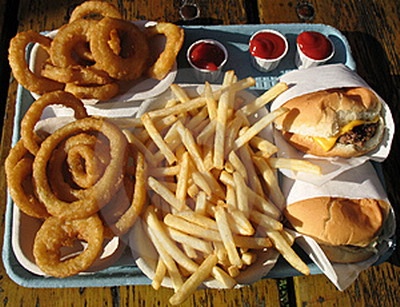Probably shouldn't be drinking litres of that either...sogood wrote: As pointed out early in my career by the biochemistry lecturer, Fructose is a key constituent of that other important 's fluid'. Said to be quite enticing and healthy! It must be good!
Beyond first-world diets.
The information / discussion in the Cycling Health Forum is not qualified medical advice. Please consult your doctor.
-
Venus62
- Posts: 239
- Joined: Wed Dec 05, 2012 12:55 pm
- Location: Brisbane
Re: Beyond first-world diets.
Postby Venus62 » Thu Mar 07, 2013 3:25 pm
-
Venus62
- Posts: 239
- Joined: Wed Dec 05, 2012 12:55 pm
- Location: Brisbane
Re: Beyond first-world diets.
Postby Venus62 » Thu Mar 07, 2013 3:27 pm
Yes, she's pretty awesome and her ideas have stood the test of time.casual_cyclist wrote:By the way, Rosemary Stanton is one of my heroes.
- casual_cyclist
- Posts: 7758
- Joined: Fri Feb 20, 2009 11:41 am
- Location: Kewdale
Re: Beyond first-world diets.
Postby casual_cyclist » Thu Mar 07, 2013 3:30 pm
The guy who runs the anti-Gillespie site insists that exercise is effective for weight loss. He claims that "the science" backs this view. One review doesn't equal an evidence base but lets have a look at the review in detail and see what it says about exercise and weight loss:Venus62 wrote:The 2012 Cochrane review had a slightly different conclusion.
http://onlinelibrary.wiley.com/doi/10.1 ... 3/abstract" onclick="window.open(this.href);return false;
"The findings are suggestive of a small but potentially important reduction in cardiovascular risk on modification of dietary fat, but not reduction of total fat, in longer trials. Lifestyle advice to all those at risk of cardiovascular disease and to lower risk population groups, should continue to include permanent reduction of dietary saturated fat and partial replacement by unsaturates. The ideal type of unsaturated fat is unclear."
Although evidence supporting the efficacy of exercise to achieve weight loss is disappointing, studies do support the efficacy of exercise to prevent weight gain.
Even if exercise does not result in weight loss, it confers significant health benefits to people with overweight and obesity.
http://onlinelibrary.wiley.com/doi/10.1 ... .pub3/fullStudies examining the magnitude of weight loss achievable with exercise have shown disappointing results.
Hardly the dramatic evidence I would use to "prove" my case. I guess it comes down to the meaning of the word "effective" as in "exercise is effective for weight loss". If you have a look at the actual data:
Personally, I wouldn't rate 1.1 kg over 12 months as "effective" but "effective" is undefined, so it could go either way.In the group exercise plus diet versus diet alone fourteen trials involving 1049 participants included data regarding weight loss that were suitable for meta-analysis. Participants in both groups lost weight across trials. The pooled effect for interventions with a follow-up between 3 and 12 months was a reduction in weight of 1.1 kg (95% confidence interval (CI), 0.6 to 1.5) in the exercise and diet group compared with the diet alone group.
In any case, I think that the most telling conclusion is this:
From my point of view, it is an important review for highlighting the non-weight related benefits of exercise:Diet was demonstrated to be significantly more effective at facilitating weight loss than exercise in this meta-analysis.
My take on this is that a claim that exercise is effective for weight loss is not strongly supported by current evidence. However, there are reasons that people should exercise, not limited to improvments in cardiovascular risk factors, which are supported by the evidence.A strength of this study compared with other systematic reviews and meta-analyses of exercise and weight loss is the inclusion of cardiovascular disease (CVD) risk factors as outcome measures for analyses (Miller 1997; McTigue 2003; Douketis 2005). Positive effects on CVD risk factors were demonstrated with exercise interventions in overweight and obese adults in this study. Those who participated in exercise interventions alone reduced systolic and diastolic blood pressure, cholesterol, triglycerides and fasting serum glucose. They also increased HDL levels. The changes that were statistically significant compared with no treatment were changes in diastolic blood pressure, triglycerides, HDL and glucose.
These changes were independent of significant weight loss. Weight loss does not appear to uniformly improve cardiovascular risk factors, particularly if 5% or less body weight reduction (Douketis 2005). However, RCTs have demonstrated that exercise improves risk factors for CVD in adult populations (Campbell 1997; Hu 1999; Hu 2000). The findings of this study indicate that the benefit of exercise on cardiovascular risk factors extends to adults with overweight and obesity.
Exercise combined with diet also has a positive effect on cardiovascular risk factors. Consistent with previous research, participants in this study who combined exercise with diet reduced systolic and diastolic blood pressure, serum cholesterol and triglycerides, and fasting serum glucose. However, when directly compared, exercise combined with diet was no more effective in reducing the above cardiovascular risk factors than diet alone.
The take home message is that we should tell people to eat for thier waist and exercise for thier heart.
-
Venus62
- Posts: 239
- Joined: Wed Dec 05, 2012 12:55 pm
- Location: Brisbane
Re: Beyond first-world diets.
Postby Venus62 » Thu Mar 07, 2013 3:41 pm
It's worth looking into what the Cochrane review process actually entails. "Cochrane Reviews are systematic reviews of primary research in human health care and health policy, and are internationally recognised as the highest standard in evidence-based health care." It's the site doctors and med students are urged to go to for best-practice medicine.casual_cyclist wrote:One review doesn't equal an evidence base but lets have a look at the review in detail and see what it says about exercise and weight loss:
I don't dispute that exercise alone won't cause massive shifts in weight (I think the term I used was "modest" losses). And I agree that the other health benefits of exercise should also be emphasised.
- twizzle
- Posts: 6402
- Joined: Wed Aug 13, 2008 11:45 am
- Location: Highlands of Wales.
Re: Beyond first-world diets.
Postby twizzle » Thu Mar 07, 2013 4:18 pm
...real cyclists don't have squeaky chains...
-
Venus62
- Posts: 239
- Joined: Wed Dec 05, 2012 12:55 pm
- Location: Brisbane
Re: Beyond first-world diets.
Postby Venus62 » Thu Mar 07, 2013 4:31 pm
She's also saying nuts and fish oils are bad as well. That's a shame as you'll lose the protective effect of omega 3s on macular degeneration.twizzle wrote:Article by nutritionist putting the boot into polyunsaturated.
- casual_cyclist
- Posts: 7758
- Joined: Fri Feb 20, 2009 11:41 am
- Location: Kewdale
Re: Beyond first-world diets.
Postby casual_cyclist » Thu Mar 07, 2013 4:33 pm
That corporate lawyer doesn't have a very smart business model. If you go on his facebook page, he will tell you what is in his books for free.Venus62 wrote:Absolutely agree that scientists, including dieticians, sometimes contradict each other. I'd still trust the opinion of one over a corporate lawyer.
As I said before, I think there is enough good information that can be found without forking over good money for ANYONE'S wonderful new diet book.
The titles "Sweet Poison", "Big Fat Lies" and "Toxic Oils" irk me too. They are sensationalist and extreme. However, given the extent of the obesity epidemic, perhaps something extreme is needed? Maybe we need to tell people that their food is killing them to get their attention?
I have followed the whole sugar argument more than the whole fat/oil argument, so I will comment on that first. The basic thesis is that excess fructose consumption is driving the obesity epidemic. It's pretty fair to say overall, this is demonstrably untrue. I would say that refined carbohydrates (white flour, bread, potato chips (crisps and fries) and hydrogenated fats are equally to blame. The 'perfect storm" for obesity for me is products that combine these like white flour, sugar and hydrogenated fat. Think cakes, biscuits, muffins, slices etc. These hyperpalatable and ubiquitous "foods" add so little nutrition and so much energy to the diets of people who unconsciously consume them in excess. That said, I do think the sugar people are onto something.
I used to eat sugary foods all the time. By this I mean that every meal was (or included) something sweet. I ate foods with added refined sugar to feel satisfied after a meal (or the sugary food was the meal) or I didn't feel satisfied. However, the food I was eating made me feel hungry all the time. So, I was eating up to 9 times a day.
Just over a year ago I quit refined sugar cold turkey. I still ate fruit, but no refined sugar added to foods. I noticed a dramatic decrease in my hunger levels and ate less food as a result. In my case, I swapped out the sugary foods for more whole foods, like fruit, veggies and legumes, so I ended up with a pretty good diet. However, as Rosemary Stanton points out, people who replace sugary foods with fatty/salty processed foods are not likely to be better off.
http://theconversation.edu.au/what-role ... -gain-7424I have no objection to people giving up sweet foods because most of them are junk foods, but the insistence on looking only at the sugar in foods and not on their kilojoules from other components can lead some to a distorted eating pattern where they think it's OK to eat sausages and bacon fried in butter or to eat pastry or lots of crisps and other savoury junk foods - all because they don't contain sugar. There's plenty of evidence that such eating patterns can do long-term damage.
[...]
Why not just go for less junk food?
I absolutely agree that simply quitting sugar will not give someone a healthy diet if they simply swap out sugary junk foods for salty/fatty junk foods. A healthy diet needs to be considered and planned. However, I do think that quitting sugar may have an important role for some people. If the food that people eat makes them hungry, and by hungry I mean eating foods that make people feel:
http://toyourhealthnutrition.blogspot.c ... ty-by.html...shaky, head-achy, weak, fatigue, get abdominal cramps or spasms and other symptoms which they consider manifestations of hunger symptoms because they are relieved by eating.
they are less likely to make nutritious food choices (nutrient dense rather than energy dense). I know that when I got the "shakes" and felt "starving" I would binge on energy dense foods in preference to nutrient dense foods. So, if people quit sugar and don't feel the symptoms outlined above, they may be in more of a position to make rational food choices rather than feeling "driven" to eat junk food.
Preliminary research into replacing energy dense with nutritionally dense foods indicates that participants reported feeling less hungry. So, quitting sugar may be an important first step down the path to healthy eating. More research is needed in this regard.
I don't think that the "sugar ban" needs to be permanent though. An occasional piece of cake at morning tea hasn't resulted sugar cravings or sugar binges for me. I just don't think that junk foods are "everyday" foods.
It's interesting the argument that sugar is not addictive. The argument is based on the DSM medical definition of addiction, which does not apply to sugar.
http://www.fitwatch.com/weight-loss/sig ... r-749.htmlHowever, a secondary definition of addiction describes “the persistent, compulsive use of a substance that is known to be harmful.” That would certainly describe the relationship that many people have with refined cane sugar. They know that ingesting large amounts of sugar isn’t good for them, but they can’t seem to stop themselves from eating it anyway.
I think that is a fair call. Coming from a background of severe sugar cravings three to four times a day (to the point of making a eating icing), it sure felt addictive. It is interesting that since "quitting" sugar, I have not craved sugar once, even though I have, at times, eaten sugary food.
So, the thesis that sugar is addictive, sugar drives obesity and quitting sugar will help people get control of their appetites and lose weight may be sensationalist, based on junk science and profit driven. However, I think it is good advice for people struggling with their weight as a first step towards a healthier lifestyle.
- mikedufty
- Posts: 788
- Joined: Fri Mar 27, 2009 5:52 pm
- Location: Western Australia, Bull Creek
Re: Beyond first-world diets.
Postby mikedufty » Thu Mar 07, 2013 4:47 pm
-
Venus62
- Posts: 239
- Joined: Wed Dec 05, 2012 12:55 pm
- Location: Brisbane
Re: Beyond first-world diets.
Postby Venus62 » Thu Mar 07, 2013 4:49 pm
Sure, as long as they do what you did and replace it with healthy foods and not a different type of crap food. All the government health guidelines that I know of advocate eating less refined sugar anyway.casual_cyclist wrote: So, the thesis that sugar is addictive, sugar drives obesity and quitting sugar will help people get control of their appetites and lose weight may be sensationalist, based on junk science and profit driven. However, I think it is good advice for people struggling with their weight as a first step towards a healthier lifestyle.
The other problem as I see it with these books is that usually it is the health conscious that tend to buy them anyway, so for them it tends to be a variation on a diet that may well be healthy to start with. So the same people who ignore the health guidelines will probably also ignore this book too.
- twizzle
- Posts: 6402
- Joined: Wed Aug 13, 2008 11:45 am
- Location: Highlands of Wales.
Re: Beyond first-world diets.
Postby twizzle » Thu Mar 07, 2013 4:52 pm
I know - weird, isn't it. I'll have to read some of the cited bits.Venus62 wrote:She's also saying nuts and fish oils are bad as well. That's a shame as you'll lose the protective effect of omega 3s on macular degeneration.twizzle wrote:Article by nutritionist putting the boot into polyunsaturated.
...real cyclists don't have squeaky chains...
-
Venus62
- Posts: 239
- Joined: Wed Dec 05, 2012 12:55 pm
- Location: Brisbane
Re: Beyond first-world diets.
Postby Venus62 » Thu Mar 07, 2013 5:02 pm
Personally I won't be rushing to follow her advice. Once again it gets back to a bit of common sense and moderation. If people changed their eating habits every time a new book was published or a blog was posted, you'd be afraid to eat anything! If overweight people followed the basic premise of eating a reasonable quantity of unprocessed or minimally processed foods, imagine what could be achieved? Making it complicated deters people from even trying. Maybe "avoid beige food" could become a new mantra?twizzle wrote: I know - weird, isn't it. I'll have to read some of the cited bits.
- casual_cyclist
- Posts: 7758
- Joined: Fri Feb 20, 2009 11:41 am
- Location: Kewdale
Re: Beyond first-world diets.
Postby casual_cyclist » Thu Mar 07, 2013 5:42 pm
Bingo! How brown is junk food?Venus62 wrote:Maybe "avoid beige food" could become a new mantra?


Except sweet junk food. That is colourful!
http://2.bp.blogspot.com/-jqiBT31g9A4/T ... G_1388.JPG
but not as good as fruit

One of the things I did on my journey towards healthier eating was "made over" my meals to turn them from brown to colourful.
Nachos before:

Nachos after (that is greek yoghurt, not sour cream):

Chilli bean pancakes before:

Chilli bean pancakes after (sweet potato and corn fritters with chilli bean sauce and salad:

Home made pizza after (I don't have a before):

Ick! How brown was the food I was eating before?
- twizzle
- Posts: 6402
- Joined: Wed Aug 13, 2008 11:45 am
- Location: Highlands of Wales.
Re: Beyond first-world diets.
Postby twizzle » Thu Mar 07, 2013 8:06 pm
Maybe the smartest thing to do is the simplest - only eat things (or cook with things) your grandmother would recognise. Or maybe great-grandmother. It all looks pretty screwed up to me if you look back at the last 100 years.
Sent from my iThingy...
...real cyclists don't have squeaky chains...
- sogood
- Posts: 17168
- Joined: Thu Aug 31, 2006 7:31 am
- Location: Sydney AU
Re: Beyond first-world diets.
Postby sogood » Thu Mar 07, 2013 9:17 pm
Yes, one can certainly successfully make "story" and money out of the sea of research data out there. The true science to make sense of it all and create a unified logic out of it. Some have it and some don't.twizzle wrote:The more I read, the more I realise that science understands only a small percentage of what is really going on. At one side you have people looking at groups of people, and drawing conclusions. At the other side are people looking at cellular puzzles, trying to make sense of it all. And often the conclusions are totally opposed. About the only constant is the people standing behind them trying to make money from it.
RK wrote:And that is Wikipedia - I can write my own definition.
- twizzle
- Posts: 6402
- Joined: Wed Aug 13, 2008 11:45 am
- Location: Highlands of Wales.
Re: Beyond first-world diets.
Postby twizzle » Fri Mar 08, 2013 1:05 pm
Wiki entry on beetroot.
Australian sports commission paper.
"Risks". Same info is on DopeStrong, but I didn't want to link it.
Study into effects on running.
...real cyclists don't have squeaky chains...
- casual_cyclist
- Posts: 7758
- Joined: Fri Feb 20, 2009 11:41 am
- Location: Kewdale
Re: Beyond first-world diets.
Postby casual_cyclist » Fri Mar 08, 2013 2:34 pm
loltwizzle wrote:Slight change in direction. Beetroot, part of my "staple diet" these days. The only time I've been caught out was when dehydrated after a crit about a month ago when I was seriously worried I might have been peeing blood.
I have done that too. It gave me a shock as well.
- casual_cyclist
- Posts: 7758
- Joined: Fri Feb 20, 2009 11:41 am
- Location: Kewdale
Re: Beyond first-world diets.
Postby casual_cyclist » Fri Mar 08, 2013 4:10 pm
I would want to know: weight, body fat%, lean muscle%, blood pressure, cholesterol and bone mineral density. It would be interesting for me to see the researcher discuss how these changed over the course of the trial. What data would you be interested in seeing collected. The reason I ask is because I see studies done which are interesting but I always wish they had collected some additional data to what was collected. What do you think?
-
Venus62
- Posts: 239
- Joined: Wed Dec 05, 2012 12:55 pm
- Location: Brisbane
Re: Beyond first-world diets.
Postby Venus62 » Fri Mar 08, 2013 5:24 pm
Full lipid profile (HDLs, LDLs etc), fasting blood glucose, basic haematology (haemoglobin, RBC count). Also patient satisfaction. Is the eating/exercise plan sustainable in the long term? Affordable? Make you wish you were dead instead?casual_cyclist wrote:What do you think?
- casual_cyclist
- Posts: 7758
- Joined: Fri Feb 20, 2009 11:41 am
- Location: Kewdale
Re: Beyond first-world diets.
Postby casual_cyclist » Fri Mar 08, 2013 6:57 pm
HDL/LDL and fasting blood glucose are a good one. I wonder if baseline Leptin/Ghrelin/Insulin/NPY levels would be easy to measure and compare in the follow ups.Venus62 wrote:Full lipid profile (HDLs, LDLs etc), fasting blood glucose, basic haematology (haemoglobin, RBC count). Also patient satisfaction. Is the eating/exercise plan sustainable in the long term? Affordable? Make you wish you were dead instead?casual_cyclist wrote:What do you think?
Apparently, blood levels of leptin and ghrelin are correlated to weight loss or regain after dietary intervention. Higher ghrelin levels at the end of the intervention were predictive of weight regain if ghrelin levels don't drop over time (1). Also, Neuropeptide (NPY), which stimulates appetite, plays a major role in controlling whether the body burns or conserves energy. Apparently, when the body takes in less energy or is on a diet, high levels of NPY signal to the body that it's in starvation mode, and the body subsequently starts storing as much energy as possible (2).
What I want to know is this: at what % calorie reduction below maintenance requirements does the leptin/ghrelin thing and the NPY thing kick in to either prevent weight loss or cause weight re-gain? 1%, 5%, 10%? I haven't seen any research that compared very low calorie diets with modest calorie reductions. The reason I am interested in this is that having lost 29kg through lifestyle interventions, I should be hungry all the time and re-gain the weight... I'm not and haven't or my NPY levels should have kicked in and prevented the weight loss in the first place, which they didn't. Now, I presume this is becuase I introduced only very moderate calorie reductions, at a weight loss rate of a maximum of 2kg per month with an average of 1kg to 1.5kg per month. My thesis is that slow weight reduction may be sustainable (in terms of long term weight maintenance) but faster weight loss may result in leptin/grehlin issues or NPY issues. It would be really good to know if there is a hard limit, say 5%, and whether this applies to everyone or whether everyone is different i.e subject 1 is 3% and subject 2 is 8%.
(1) http://www.precisionnutrition.com/lepti ... eight-loss
(2) http://www.smh.com.au/lifestyle/life/wh ... z2MvrmT3oO
- casual_cyclist
- Posts: 7758
- Joined: Fri Feb 20, 2009 11:41 am
- Location: Kewdale
Re: Beyond first-world diets.
Postby casual_cyclist » Fri Mar 08, 2013 8:09 pm
http://www.ncbi.nlm.nih.gov/pubmed/21333011Overall, interventions produced clinically meaningful weight loss (3-5 kg at 12 months; 2-3 kg at 36 months) and increased physical activity (30-60 mins/week of moderate activity at 12-18 months).
3-5kg at 12 months isn't that fantastic.
- twizzle
- Posts: 6402
- Joined: Wed Aug 13, 2008 11:45 am
- Location: Highlands of Wales.
Re: Beyond first-world diets.
Postby twizzle » Fri Mar 08, 2013 8:16 pm
Anyway... his interpretation of the science is that the body works on a set-point weight based on 'normal' hormone levels. The more you abuse your body with food, the more your set-point weight goes up, the dreaded "metabolic syndrome". The studies quoted pretty much agree that cutting back calories or exercising without increasing food intake both result in a slower metabolism that defeats any attempt at weight loss. Same a s eating a little extra causes an increase in metabolism and only a small impact on weight. So his solution to weigh loss is to 'reset' the hormone levels via diet & exercise. Without going into too much detail, my interpretation is that it's basically Paleo (yes, protein again!, around 2.5g/kg at the upper end) with some extreme cardio once a week and extreme eccentric body building (weight-dropping as it were) once a week.
...real cyclists don't have squeaky chains...
- twizzle
- Posts: 6402
- Joined: Wed Aug 13, 2008 11:45 am
- Location: Highlands of Wales.
Re: Beyond first-world diets.
Postby twizzle » Fri Mar 08, 2013 8:17 pm
It is if you only weighed 50kg to start with. I wonder what the chances of that are, though?casual_cyclist wrote:Looking at a big review now.http://www.ncbi.nlm.nih.gov/pubmed/21333011Overall, interventions produced clinically meaningful weight loss (3-5 kg at 12 months; 2-3 kg at 36 months) and increased physical activity (30-60 mins/week of moderate activity at 12-18 months).
3-5kg at 12 months isn't that fantastic.
...real cyclists don't have squeaky chains...
-
Venus62
- Posts: 239
- Joined: Wed Dec 05, 2012 12:55 pm
- Location: Brisbane
Re: Beyond first-world diets.
Postby Venus62 » Fri Mar 08, 2013 8:26 pm
I guess you also need to consider that these people may have continued to GAIN weight, as many obese people do.twizzle wrote: It is if you only weighed 50kg to start with. I wonder what the chances of that are, though?
- twizzle
- Posts: 6402
- Joined: Wed Aug 13, 2008 11:45 am
- Location: Highlands of Wales.
Re: Beyond first-world diets.
Postby twizzle » Fri Mar 08, 2013 8:31 pm
At some point energy in = energy out and they stop. Only the very dedicated keep gaining weight. Like the woman in the wheelchair drinking from a 2lt Chocolate milk in Coles. (shudders at memory).Venus62 wrote:I guess you also need to consider that these people may have continued to GAIN weight, as many obese people do.twizzle wrote: It is if you only weighed 50kg to start with. I wonder what the chances of that are, though?
(I used to weigh 127kg, it took me 11 years to go from 115kg to 127Kg. Now 93Kg after six years of effort.).
...real cyclists don't have squeaky chains...
- casual_cyclist
- Posts: 7758
- Joined: Fri Feb 20, 2009 11:41 am
- Location: Kewdale
Re: Beyond first-world diets.
Postby casual_cyclist » Fri Mar 08, 2013 9:55 pm
It takes a lot of dedicated eating to gain weight, although it doesn't seem like it at the time. It is also stressful, which I think helps the body store fat (through cortisol?). Anyway. I went from 75 kg to 113 kg over quite a number of years (sorry, didn't keep records). I don't recall it being a lot of effort but looking back it was pretty expensive! Not sure how much it cost me but it wasn't cheap. I'm finding eating healthy food is a lot easier on the ol' wallettwizzle wrote:At some point energy in = energy out and they stop. Only the very dedicated keep gaining weight. Like the woman in the wheelchair drinking from a 2lt Chocolate milk in Coles. (shudders at memory).Venus62 wrote:I guess you also need to consider that these people may have continued to GAIN weight, as many obese people do.twizzle wrote: It is if you only weighed 50kg to start with. I wonder what the chances of that are, though?
(I used to weigh 127kg, it took me 11 years to go from 115kg to 127Kg. Now 93Kg).
- General Australian Cycling Topics
- Info / announcements
- Buying a bike / parts
- General Cycling Discussion
- The Bike Shed
- Cycling Health
- Cycling Safety and Advocacy
- Women's Cycling
- Bike & Gear Reviews
- Cycling Trade
- Stolen Bikes
- Bicycle FAQs
- The Market Place
- Member to Member Bike and Gear Sales
- Want to Buy, Group Buy, Swap
- My Bikes or Gear Elsewhere
- Serious Biking
- Audax / Randonneuring
- Retro biking
- Commuting
- MTB
- Recumbents
- Fixed Gear/ Single Speed
- Track
- Electric Bicycles
- Cyclocross and Gravel Grinding
- Dragsters / Lowriders / Cruisers
- Children's Bikes
- Cargo Bikes and Utility Cycling
- Road Racing
- Road Biking
- Training
- Time Trial
- Triathlon
- International and National Tours and Events
- Cycle Touring
- Touring Australia
- Touring Overseas
- Touring Bikes and Equipment
- Australia
- Western Australia
- New South Wales
- Queensland
- South Australia
- Victoria
- ACT
- Tasmania
- Northern Territory
- Country & Regional
Who is online
Users browsing this forum: No registered users
- All times are UTC+10:00
- Top
- Delete cookies
About the Australian Cycling Forums
The Australian Cycling Forums is a welcoming community where you can ask questions and talk about the type of bikes and cycling topics you like.
Bicycles Network Australia
Forum Information
Connect with BNA
This website uses affiliate links to retail platforms including ebay, amazon, proviz and ribble.
